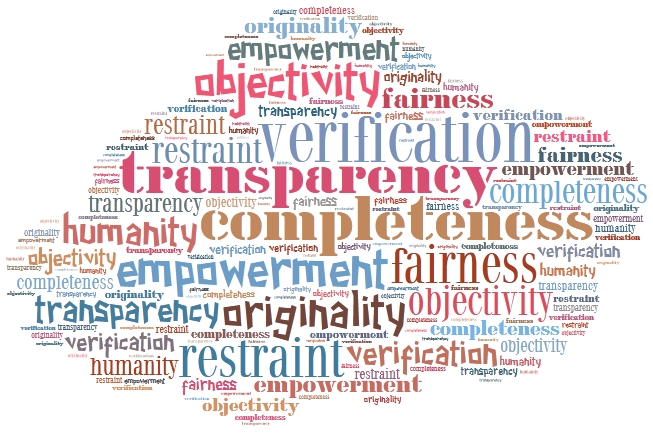
They labor tirelessly with selfless devotion to their profession in their modest office near Saryan Park in Yerevan. During our recent trip to Armenia, my wife and I were honored to spend an enlightening few hours with Maria Titizian and a few members of her staff at EVN Report. A few weeks earlier, we were fortunate to meet Maria at a dinner in the Boston area and to attend a lecture she gave on the subject of independent journalism. She discussed it from a personal career perspective and its evolution in the media environment of Armenia. I was intrigued by her story and connected with the natural relationship between democracy and independent journalism.
We wanted to learn more, and Maria was gracious enough to welcome us on a beautiful sunny afternoon in bustling Yerevan. Her journey can be summarized with descriptors such as commitment and passion. Raised in Toronto, she and her husband repatriated to Armenia with their children over 20 years ago to make a difference in the democratization of the young country. Her vehicle for contributing was the field of journalism. Maria has made extensive contributions to Armenian journalism with time at The Armenian Reporter and CivilNet before starting EVN Report in 2017 with, as she said, “no money, no office and just a laptop.” When people come together with such devotion to a mission, the assemblage of talent and innovation is impressive. Such is the case with EVN Report. Roubina Margossian is the dynamic managing editor whose passion and innovation are front and center. Heghine Gyulnazaryan is the programs and compliance manager whose skill and professionalism contribute to an impressive team.
Once again, the leadership capability of Armenian women is on full display. Although the government structure is making strides, Armenian women are still underrepresented in elected and appointed positions. Most of the NGOs and nonprofits are led by women in Armenia, which reflects the remarkable talent pool available to the nation. EVN Report has a core of full- and part-time staff but invites journalists to present content on a freelance basis. Their board of directors and editorial board are full of progressive professionals devoted to the same mission…encouraging an informed diaspora and Armenia through independent journalism.
In reading the mission statement of EVN Report, we gain valuable insight into the essence of their dedication and impact. EVN Report seeks to optimize the quality of their content as “committed journalists, writers and analysts based in Yerevan, the diaspora and beyond.” Their intent is to bring a new and “exciting narrative to the events shaping our lives in Armenia, the region and throughout the world.” Maria explained to us that with content published in English and Armenian, they consider their target audience not only Armenia but also the vast Armenian diaspora and non-Armenians. Content covers a variety of subjects including politics, economics, art and innovation. They utilize a variety of mediums that include print, digital, podcasts and multimedia storytelling.
Our conversation gravitated toward the critical challenge that our media community faces in keeping the Armenian nation and international community informed and educated with content that is fact-based and differentiates news, analysis and opinions. I have been an avid reader of EVN Report for these very reasons. Analyses (such as the monthly security report) are crisp, well-documented and thought provoking. Opinion pieces are substantiated, giving the reader a variety of perspectives reflecting professional content. Columns are full of important and unique subject matter. My experience has been that the EVN Report satisfies one of the most fundamental needs of the reader — to be informed and challenged beyond the obvious. When I read an offering from Sheila Paylan or Nerses Kopalyan, my mind expands with new possibilities and renewed enthusiasm for the subject. When an audience is both informed and intellectually stimulated, it is called impactful journalism. In a world where X or Instagram give instant gratification for information, EVN Report offers depth and creativity. I have found that listening to some of the content through the podcast or audio replays while driving results in quality consumption. All this has been accomplished in just a few short years.
Journalism has become a more controversial topic in the last 20 years, as the profession has been impacted by digital transitions and institutional bias. Take the case of broadcast, print and digital journalism in America. There was a time when the term “independent” was an unnecessary adjective for journalism. Most consumers were not obsessed with the political leanings of journalists, because news was fact-based and editorializing was a conscious act. Slowly, the two worlds merged, the lines became blurred, and partisan thinking became the new reality. I recall an era when broadcast journalists presented the news based on facts, and the difference between networks was the personality of the journalists. For example, Walter Cronkite was an astonishing credible voice of the truth. He was trusted because he simply presented the news. Some stations would allocate time for editorializing on certain subjects. As the lines became blurred, audiences began to wonder if the selective blending of facts and opinions was dangerous.
We can debate whether the partisan divide created media divisions or whether it was the reverse, but clearly many Americans consider media bias to be problematic. One of the main concerns is not only introducing editorial content into news but the selective use of news. Prior to this evolution, one could watch and read a variety of TV news broadcasts and newspapers and expect similar content. In today’s reality, listening to MSNBC, CNN or Fox would give one the impression that we live in different worlds. The media remains a powerful influence in shaping the views of Americans, but it has resulted in less informed behavior and more partisan division. In addition, social media has become the “anti-journalism” with unsubstantiated and shallow content.
The American experience has been written in the context of a mature democracy. In the Armenian experience, journalism has to be viewed as a contributor to the development of an evolving democracy. Most of the post-Soviet nations initially transitioned their media as they did their economies — from state-controlled to state-influenced or owned by oligarchs. Thankfully, “independent” journalism has slowly emerged through digital and print platforms. When I read the content of EVN Report, I do not feel they are “anti” anything but “pro” knowledge, truth and Armenia’s development. In our binary view of issues, it is difficult for us to accept that courageous and dedicated journalists create content simply for the advancement of democracy in Armenia. We are laced with cynicism that prevents us from seeing the quiet heroes in our nation-building process. We view ourselves as unable to advocate without opposing another group. Pan-Armenian thinking is an antidote since it requires tolerance and a search for common ground. It was such a pleasure to sit with the EVN staff and feel positivity and optimism.
The connection between credible journalism and the advancement of democracy is inseparable. When we advocate for journalism, we advocate for democracy.
When Armenia became independent 33 years ago, it began the transition from a centralized to market economy. The easiest part was stating that intention. The actual transition was difficult and obstructed with corruption, self interest and societal development. Slowly the entrepreneurial instincts of the Armenian people returned, the government focused on removing layers of corruption, and we see the progress today. Journalism is a fundamental pillar of a democratic society. The evolution to democracy is a long journey involving legislation, enforcement, civil society and a healthy journalistic culture. The connection between credible journalism and the advancement of democracy is inseparable. When we advocate for journalism, we advocate for democracy.
Similar to many of you, I consider myself a strong believer in the importance of Armenian journalism. It is the reason why I am privileged to write for the Weekly. The role in the diaspora is slightly different in that keeping the diaspora informed is the primary function. The origin of journalism in the diaspora is rooted in its history as the organ of the political parties. The dual role of supporting Armenian interests while keeping the community informed remains intact.
Still, diaspora media can contribute to the growth of democracy in the homeland. One of the questions we left on the table during our visit was how to expand the reach of offerings like EVN Report in the diaspora. This is a critically important yet complex question. The viewing and reading habits in our society are alarming. We gravitate toward quick and concise content at the expense, many times, of quality and sustainable impact. It is a frustrating challenge for serious journalists. Fortunately, EVN Report is a great example of a media offering with options. In our over-scheduled lives, we use a lack of time as an excuse for limited reading. I find audio content to be a great option. We are in our cars a great deal. I challenge each of us to select some content from the ENV Report digital menu and listen in the car. You will not regret it. In the interim, it is a serious question that is deserving of our time. An uninformed Armenian community will lead to our decline. It has often been said that our vibrancy will end only when we choose ambivalence, which begins with ignorance. Quality journalistic offerings afford us the opportunity to combat this malaise.








